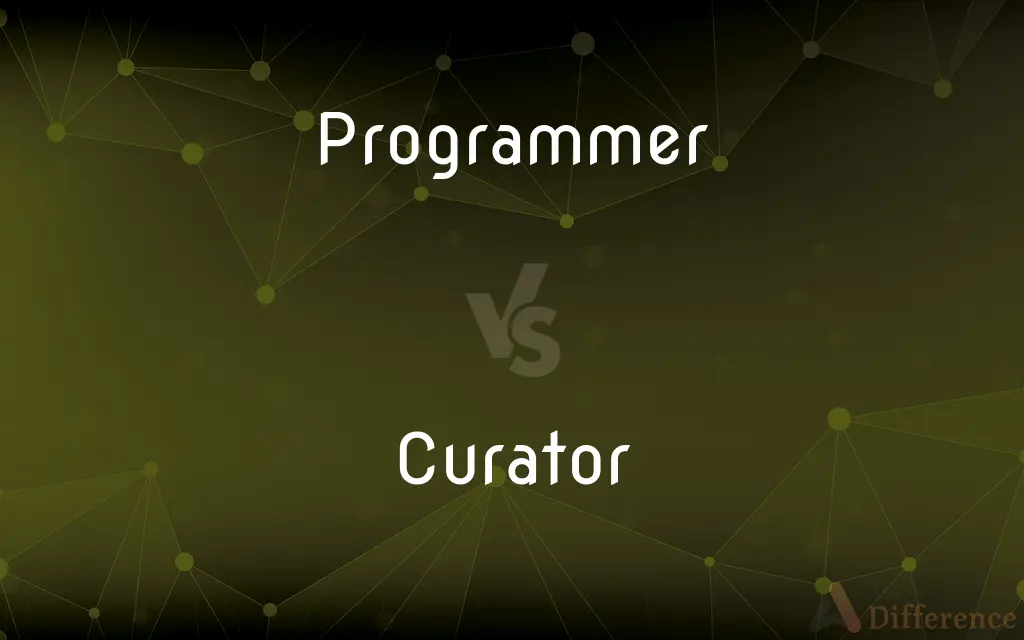Programmer vs. Curator — What's the Difference?
By Urooj Arif & Fiza Rafique — Updated on May 2, 2024
A programmer writes and maintains code for software applications, focusing on technology and development; a curator manages collections in museums or galleries, specializing in cultural preservation and exhibition.

Difference Between Programmer and Curator
Table of Contents
ADVERTISEMENT
Key Differences
Programmers are professionals who write, debug, and maintain the software code that powers apps, websites, and other digital platforms. On the other hand, curators are responsible for the care, development, and display of collections in museums, galleries, or cultural institutions.
While programmers often require skills in languages such as Python, Java, or C++, and a strong understanding of algorithms and system design, curators typically need expertise in art history, archaeology, or a related field, along with skills in collection management and exhibition planning.
Programmers work primarily in the technology sector, which includes software companies, IT departments, and tech startups, focusing on creating functional and efficient software solutions. Conversely, curators are usually employed by cultural institutions like museums and galleries, focusing on the acquisition, research, and exhibition of historical, artistic, or scientific items.
The daily tasks of a programmer might include writing code, testing software, and collaborating with other developers on complex projects. In contrast, a curator's daily responsibilities could involve researching artifacts, designing exhibit layouts, and writing catalog descriptions or grant proposals.
Programmers are critical in developing new technologies and innovations in the digital world, continuously adapting to rapidly changing technology trends. Whereas curators preserve historical and cultural narratives, ensuring that valuable knowledge and art are accessible to the public and preserved for future generations.
ADVERTISEMENT
Comparison Chart
Primary Role
Writes and maintains software code
Manages and oversees collection items
Skills Required
Coding, system design, problem-solving
Expertise in art history or science, management
Sector
Technology, software development
Museums, galleries, cultural institutions
Daily Tasks
Coding, debugging, software testing
Researching, planning exhibits, cataloging
Impact
Advances technology and digital solutions
Preserves and presents cultural heritage
Compare with Definitions
Programmer
A professional who writes code for creating software applications.
The programmer fixed a bug that was causing the application to crash.
Curator
A professional who manages collections in museums or galleries.
The curator arranged a new exhibit on ancient Roman tools.
Programmer
Works often in team settings, particularly in software development.
Our programmer team just released a new app.
Curator
Often involved in educational programs related to their exhibits.
The curator developed an interactive tour for students.
Programmer
Plays a crucial role in the technology industry.
Programmers are essential for developing innovative tech solutions.
Curator
Responsible for the research and exhibition of collections.
As a curator, her expertise in medieval art guides her acquisitions.
Programmer
Focuses on creating functional, user-friendly software.
He's a programmer who specializes in user interface design.
Curator
Works to preserve historical and cultural artifacts.
The museum's curator is passionate about preserving indigenous art.
Programmer
Someone skilled in multiple programming languages.
As a programmer, she is proficient in both Java and Python.
Curator
Specializes in a specific type of collection, such as art, history, or science.
He is a curator focusing on natural history.
Programmer
A computer programmer, sometimes called a software developer, a programmer or more recently a coder (especially in more informal contexts), is a person who creates computer software. The term computer programmer can refer to a specialist in one area of computers or to a generalist who writes code for many kinds of software.
Curator
A curator (from Latin: cura, meaning "to take care") is a manager or overseer. When working with cultural organizations, a curator is typically a "collections curator" or an "exhibitions curator", and has multifaceted tasks dependent on the particular institution and its mission.
Programmer
(Computers) One who writes computer programs.
Curator
One who manages or oversees, as the administrative director of a museum collection or a library.
Programmer
One who prepares or writes instructional programs.
Curator
One who gathers something, organizes it, and makes it available to the public
A curator of online resources for gardeners.
Programmer
(computing) One who writes computer programs; a software developer.
Curator
A person who manages, administers or organizes a collection, either independently or employed by a museum, library, archive or zoo.
Programmer
One who decides which programs will be shown on a television station, or which songs will be played on a radio station.
Curator
One appointed to act as guardian of the estate of a person not legally competent to manage it, or of an absentee; a trustee.
Programmer
A device that installs or controls a software program in some other machine.
Curator
A member of a curatorium, a board for electing university professors, etc.
Programmer
A short film feature as part of a longer film program.
Curator
One who has the care and superintendence of anything, as of a museum; a custodian; a keeper.
Programmer
A person who designs and writes and tests computer programs
Curator
One appointed to act as guardian of the estate of a person not legally competent to manage it, or of an absentee; a trustee; a guardian.
Curator
The custodian of a collection (as a museum or library)
Common Curiosities
What is the role of a curator?
A curator manages and develops collections within museums and galleries, organizing exhibitions and overseeing the care of items.
How do the work environments differ between programmers and curators?
Programmers often work in office settings or remotely for tech companies, while curators work in museums, galleries, or cultural institutions.
What does a programmer do?
A programmer writes and maintains the code necessary for software and applications to function.
What skills are important for a curator?
Curators need to be skilled in research, exhibit design, and have a deep understanding of their specific area of cultural or scientific interest.
Which educational background is typical for programmers?
Programmers usually have degrees in computer science, software engineering, or related fields.
What educational qualifications do curators need?
Curators typically hold degrees in fields like art history, archaeology, or museum studies.
Can programmers work in museums?
Yes, programmers can work in museums, particularly on projects related to digital exhibits or interactive displays.
Can curators be involved in digital exhibitions?
Yes, curators can design and manage digital exhibitions, which involve digital representations of traditional exhibits.
What skills are crucial for a programmer?
Critical skills for programmers include proficiency in coding, problem-solving, and technical knowledge of software systems.
What is the impact of programming on society?
Programming drives technological innovation, impacting every sector from healthcare to entertainment.
How do curators impact society?
Curators preserve cultural and historical heritage, making it accessible to the public and ensuring its preservation for future generations.
What are typical challenges faced by programmers and curators?
Programmers often face rapidly changing technology and the need for continuous learning, while curators may deal with challenges like funding and the preservation of delicate items.
Are programmers involved in creative tasks?
Yes, programmers often engage in creative problem solving and may contribute to the design aspect of software development.
How do curators acquire items for their collections?
Curators acquire items through donations, purchases, or loans, often requiring negotiation and legal oversight.
Can anyone become a programmer or curator?
Becoming a programmer or curator typically requires specialized education and skills, but many resources and programs are available to help people enter these fields.
Share Your Discovery

Previous Comparison
Research vs. Feasibility
Next Comparison
Politics vs. PolicyAuthor Spotlight
Written by
Urooj ArifUrooj is a skilled content writer at Ask Difference, known for her exceptional ability to simplify complex topics into engaging and informative content. With a passion for research and a flair for clear, concise writing, she consistently delivers articles that resonate with our diverse audience.
Co-written by
Fiza RafiqueFiza Rafique is a skilled content writer at AskDifference.com, where she meticulously refines and enhances written pieces. Drawing from her vast editorial expertise, Fiza ensures clarity, accuracy, and precision in every article. Passionate about language, she continually seeks to elevate the quality of content for readers worldwide.
















































